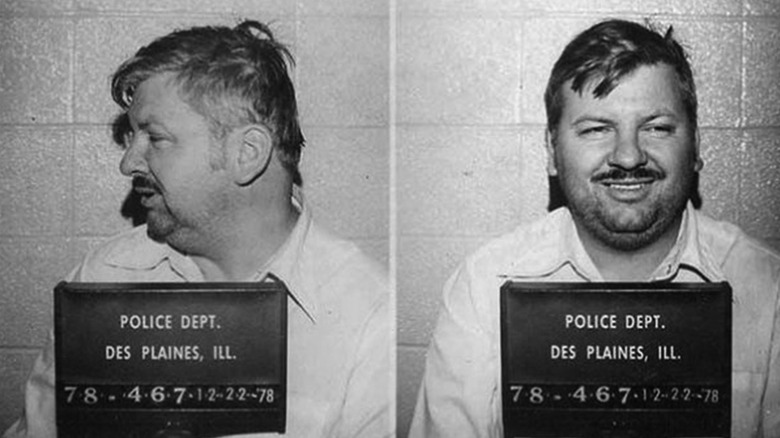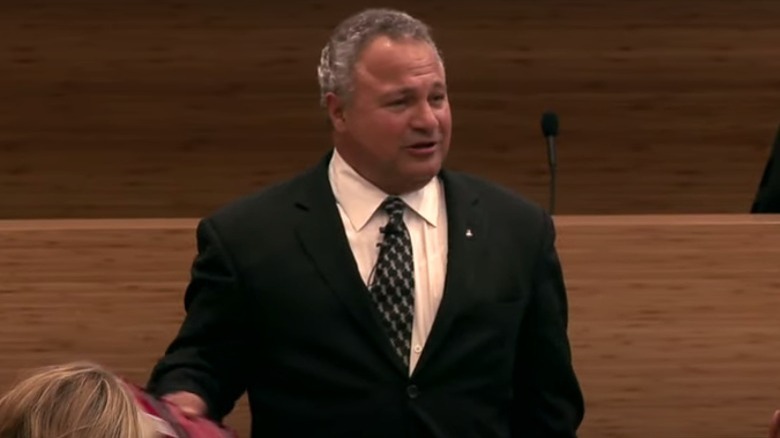What Happened To John Wayne Gacy's Lawyer After The Trial?
For a criminal defense lawyer, few things seem more difficult than successfully defending a guy who you know personally, and in whose crawlspace investigators have discovered more than two dozen bodies belonging to missing young men and boys, but that's what Sam Amirante was faced with in the late 1970s.
Amirante was just a young attorney at the time when he was approached by John Wayne Gacy to help him shake a police detail that was following him. Gacy claimed that the police were harassing him. According to Oxygen, Amirante knew Gacy — who was active in the community organizing events, serving as a Democratic Party precinct captain, and performing as his alter-ego, Pogo the Clown, at charity events — even if it was only as minor acquaintances.
What Amirante would find out not long after Gacy first asked him for help was that the police weren't harassing him. They were tailing Gacy for good a reason: He was suspected of being involved in the disappearance of a 15-year-old boy named Robert Piest. The investigation would unmask Gacy as one of history's most notorious serial killers (via the Seattle Post-Intelligencer).
Sam Amirante's early career
Amirante graduated from the Loyola University of Chicago in 1970 and enlisted in the United States Marine Corps, where he served until 1976. Early in his military tenure, Amirante received a perfect score of 500 points on the Marine Corps physical fitness test, becoming only the 17th Marine in history to accomplish the feat. He went on to become a sergeant and platoon leader, per Phi Alpha Delta.
In 1974, Amirante completed his law degree at Loyola University of Chicago while also working part-time as a police officer in Norridge, Illinois. With his law degree in hand, Amirante left the military and worked as an assistant public defender until 1978, when he started his private practice. It wasn't too long after striking out on his own that Amirante was approached by John Wayne Gacy, who at the time was running a contracting business called PDM Contractors that was by all accounts successful. The company seemed to be staffed by a revolving door of employees, many of them young men (via the Seattle Post-Intelligencer).
Gacy contacted Amirante before he was charged
A 15-year-old named Robert Piest had recently gone missing and police eventually zeroed in on John Wayne Gacy as a person of interest. Piest worked at a pharmacy; one of his co-workers reported having last seen the 15-year-old going to talk to a contractor who had been in the store about a job, per Salon. That contractor was John Wayne Gacy.
Piest wasn't seen alive again, and it was his disappearance that led to the constant police presence that followed Gacy everywhere he went. It was the same police detail he called Amirante about, at which point the young attorney agreed to be his legal counsel. According to NBC Chicago, Gacy told Amirante during his initial phone call that he had no clue why he was being followed by the police, and in the Netflix documentary series "Conversations with a Killer: The John Wayne Gacy Tapes," Amirante indicated that he had gone to the police to tell them that Gacy couldn't possibly be their man.
Gacy admitted to Amirante what he had done
On December 20, 1978, a drunken and disheveled John Wayne Gacy wandered into Sam Amirante's office, where he spent the night admitting to his attorney what he had done. One week earlier, on December 13, police had executed a search warrant on Gacy's house and discovered part of a photo receipt from the same pharmacy where Piest had worked. His co-worker recalled placing the slip in his jacket pocket, and she was able to identify that Gacy was the man that Piest had run out to talk to about a job (via Newsweek).
Amirante found himself in a bind, as turning in his client would have meant violating attorney-client privilege and would have harmed his career, but there was no doubt that Gacy was a true danger. Fortunately, police arrested Gacy the next day on a drug charge, according to the Seattle Post-Intelligencer, and with him locked away, police were able o return to his home with a second search warrant, where they discovered bodies under Gacy's home.
Amirante defended Gacy in court
Amirante knew just as well as anyone that, given the overwhelming evidence, John Wayne Gacy was guilty of many, many murders, but his job was to serve as Gacy's defense attorney, assuring that he was given a fair trial in accordance with the United States Constitution. Amirante was joined by fellow attorney Robert Motta, and the two of them set out to build a defense case for one of the most hated men in America, something which even drew animosity toward the attorney himself.
"I was never afraid of anything or anybody," Amirante told the Seattle Post-Intelligencer in 2012. "The only thing that ever bothered me is that if somebody might have wanted to get John Gacy, I might get in the way of a bullet or something. But any personal threats toward me never bothered me."
According to Distractify, the defense case they built hinged on the idea that Gacy was criminally insane. It ultimately didn't work. Gacy was found guilty and sentenced to death. Despite numerous appeals, his execution by lethal injection was carried out in 1994.
Sam Amirante after the trial
Sam Amirante (above, in 2012) revealed that defending John Wayne Gacy at trial took its toll on him both personally and professionally. He told the Seattle Post-Intelligencer that the only regret he had about taking on Gacy's defense was that the case forced him to spend a lot of time away from his family, which ultimately led to the end of his marriage.
In the mid-1980s, Amirante ran for Illinois State Senate, but he faced an uphill battle, as many voters still held it against him that he had defended Gacy. He wanted to show people who he really was and what he stood for, so he developed a bill that was ultimately passed into law called the Missing Child Recovery Act of 1984, which remedied many of the shortcomings in the legal system and law enforcement procedures that allowed Gacy to get away with his crimes for as long as he did.
Amirante went on to serve as a judge, and upon his retirement from the bench he wrote a book about his experiences defending one of America's most notorious serial killers, titled "John Wayne Gacy: Defending a Monster." Since then he has continued to practice law (via Distractify).





